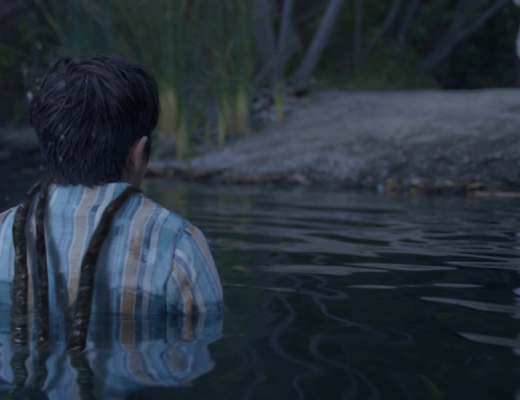Sufjan Stevens
What exactly is Sufjan Stevens ascending on his latest album? Celebrity? Corporate attention? This current political moment? God? All that and more, quite possibly — though the 15 songs that comprise The Ascension’s 80-minute runtime aren’t really concerned with those sorts of particulars. Stevens wants answers, and he doesn’t really need to explain why or say from whom. At this point, we should be pretty familiar with the offending parties anyway (see above). The Ascension establishes its dynamic pretty quickly with an opener titled “Make Me an Offer I Cannot Refuse” — a song which, rather remarkably, manages to build up a big, appealing synth melody around the titular chorus. “Make Me an Offer…” posits the album’s entire perspective and aesthetic: both the pithily blunted lyrics and the decadent electronic compositions that adorn them. Stevens has offered up his own explanation for his writing of the song, describing it as “…giving God an ultimatum…,” which he surely is, but this admission coyly skirts around the anthemic expanse of both the track itself and of the songs that soon follow it.
Of course, this is likely by design, as The Ascension is a collection of songs composed with the seeming purpose of us projecting onto them. Which makes the album somewhat unprecedented for Stevens; the closest point of comparison would be 2010’s The Age of Adz, a foray into electronic instrumentation that The Ascension builds upon, for sure, but with only a partial commitment to digital aesthetics. The melodies on Adz were augmented and shaped by strings and piano, which are instruments that Stevens forgoes here; he only retains synths and drum machines. The pared-down arrangements are, at least in part, a matter of logistics (his other instruments were in storage from a move), but they also track with Stevens’s trajectory, a necessary recalibration after being caught up in the memeification of Call Me By Your Name. (That soundtrack foray made perfect sense, almost too much sense, suffering from the fact that hiring Sufjan must have come with a very specific expectation as to the type of song to deliver.)
The Ascension is no less rich nor deep than what we expect from Stevens, but it does replace some sad boy vibes with a voice that’s moody and biting. “Video Game” exemplifies this best; it’s an aloof dance track that most immediately seems to be a rejection of newfound celebrity, but that also bears the possibility of intimate and sociopolitical critique through its delightfully blunt chorus (“I don’t wanna play your video game”). And Stevens doesn’t leave us without pulling back the curtain a little bit, making the album’s title track its penultimate one, and ending on a verbose note that reasserts the artist’s Christian faith while admitting a lack of faith in much else. The song ends on a fitting note, an open-ended question that sums up the aggression, desperation, and optimism of The Ascension and of 2020: “What Now?” M.G. Mailloux

Credit: Vevo
Taylor Swift
The presentation, in both its marketing and its media representation, of Taylor Swift’s latest has taken up more space than the music itself to an extent that it harkens back to her 2017 album rollout, when the tongue-in-cheek bitterness of Reputation’s lead single, “Look What You Made Me Do,” was met with ambivalence at best and derision at worst. Only now, the public seems ready to embrace the image that Swift is pushing: a return to the Americana origins of her career, but tempered with moody black-and-white imagery and fictitious — rather than autobiographical — songs. Starting with her 2012 classic record, Red, each Swift album has been marked by prominent aesthetic and stylistic shifts. Red leaned into the sounds of contemporary rock and pop, while 1989 delved deeper into pop history with its heavy emphasis on synths. Reputation came next, and remains Swift’s most obvious attempt at top 40 domination. But the intense love for Folklore suggests that this may be what people have always wanted from the singer-songwriter: romanticism, introspection, and youthful nostalgia.
Bonus track “The Lakes” has to represent the height of Folklore’s wild romanticism: “Those Windermere peaks look like the perfect place to cry.” The song’s folksy lyricism and acoustic instrumentation are stressed and overt — and the clearest musical corollary to the feeling created by the album’s plethora of alternative artwork (a total of nine different covers to collect). Folklore was also recorded by Swift and her collaborators in isolation, under COVID-19 lockdown, and as has been the case with just about any music released over these last 10 months, one can credit “these unprecedented times” as an easy explanation for its existence. Yet Folklore’s marketing has trended more toward an implicit recollection of the sounds and subjects that Swift has staked her career on, which frames the album as a conscious form of escapism — a move away from this unfamiliar reality. Even the song “Epiphany,” about dying loved ones, doesn’t really register as a reflection of the present, given the generality of its lyrics. The track also happens to be one of Folklore’s most gorgeous; its spare arrangement includes just Swift’s vocals with ominous orchestration and piano, slowly building the melody throughout each verse, a simple structural tact that gives the lyrical content more weight. The album progresses through the strength of its instrumentation and its melodies, but it excels with its lyrics. Swift is a great songwriter, and while Folklore might not live up to the standard set by her best writing — expectations not helped by efforts to accentuate a supposed internal narrative — the songs here serve as appealingly low stakes reminders that Swift is as keen an emotional observer as ever. Alec Lane
Machine Gun Kelly
Colson Baker: Rapper. A-List actor. World’s Best Friend. Indeed, it seems as if the world is Machine Gun Kelly’s oyster; after a brief scuffle with an angry old loser who’s twice his age, he’s somehow come out the bigger and better man, one with the wind beneath his sails and ready to add another illustrious label to his resume: that of a rockstar who isn’t into underage girls (which is a bit of an oxymoron, but regardless). Tickets to My Downfall situates the young musical savant as the heir to the pop punk throne, with Travis Barker of Blink-182 fame producing the project — and playing backing drums on every track — passing the torch to a new generation. And much like his mentor, Kelly finds his stride in writing songs that, at least for a 30-year-old man, are objectively goofy constructions: “Lonely” and “Concert for Aliens” rebel against notions of growing up, and they do so with little introspection or specificity, probably because these emotions resonated strongest about a decade ago. And he’s not doing himself any favors in toning down the misogyny by still teaming up with Blackbear. There’s even a “serious” song dedicated to his daughter at the very end, but you’d be hard-pressed to believe the attempted stab at last-minute pathos has been earned.
But there’s still a certain charm to the project, one that largely skates by on Kelly’s charisma; there’s plenty here that suggests he’s having a far better time screaming about his emotions than rapping about lacing up or being a Cleveland legend. “Bloody Valentine” and “Nothing Inside” are about as angst-ridden and catchy as anything Fall Out Boy has produced, with effectively emotive vocal performances and some slick chord progressions. On “All I Know,” where he’s joined by Trippie Redd (a fellow native from the Mistake on the Lake), he vocally seesaws through the track’s jagged hook with the type of swagger usually associated with 70s cock rock, turning banal lyrics he jacked from Operation Ivy (“All I know is I don’t know nothin’/All I know is I don’t know nothin’ at all”) into an infectious chant. Which is to also suggest that Kelly isn’t that original either, whether that’s seen in the instrumentals he picks or in the de facto song compositions: most follow a fairly basic verse-chorus-verse-chorus-bridge-chorus structure, and few pass the three-minute mark. But if one comes into this with the right inclinations — and accepts this as Colson cosplaying as his favorite musicians — then there is fun to be had, at least at seeing how hard MGK is trying to sell this. And for an artist who many wrote off a few years ago as irrelevant, there’s no denying the small pleasure of witnessing complete artistic freedom (nevermind how authentic it may or may not be) in action. As Kelly puts it best on the album’s opener, the ingeniously named “title track”: “The ones who gas you up/Only come around when the flame’s on.” And just like that, Colson Baker has taken yet another colossal W. Paul Attard

Credit: Weston Allen/PR
Dorian Electra
Dorian Electra has seemingly done the impossible — well, at least what seems impossible for most Top 40 artists these days to accomplish — with their sophomore release My Agenda. Along with an extensive list of creative collaborators, they have crafted a record formulated around a singularly haptic visual, sonic, and thematic aesthetic that synergizes into something greater than its bit parts, mashing and distorting disparate musical genres until they mutate into brief, yet infectious earworms. Characterized as a “crisis in masculinity” by the album’s gender-fluid and transgender ringleader, My Agenda flippantly cycles through a disorienting number of intensified tonalities to match the erratic nature of the many lyrical characters Electra embodies (usually lonely celibate males, secretly repressed homophobes, or some combination of the two) in a manner similar to the 100 gecs school of songwriting — which makes sense, considering Dylan Brady produced four of project’s 11 terse tracks. It easily qualifies as a bit weird and is certainly ironic enough for a cult fan base to latch onto, but there’s also a resonating candor to be found in this art once you get past some of its more gauche elements. There are moments where the line between genius and dumb gets especially thin — “Gentleman,” with its limp chorus and obnoxious horn line, feels like a phoned-in sketch that never evolved past its first basic idea — and, like nearly every hyperpop release from the past few years, there’s a discursive interlude that is practically begging to be skipped with each re-listen.
Outside of these few hiccups, though, the remaining, “proper” tracks are, for lack of a more refined descriptor, complete bangers. They are nearly all ridiculously fun cuts that still express a certain political potency, exposing the hypocritical insecurities of internet trolls and deconstructing traditionalist notions of masculinity in the process. Opener “F the World,” with its Lynchian, basic white girl fever-dream of a music video, constructs its chorus around distraught incel doublespeak — “fuck the world” in terms of both expected affection and performative dejection — and its aggressiveness is intensified by the track’s monstrous brostep instrumental, one that pulsates along to the rudimentary melody of “Canon in D,” eventually breaking into a drum and bass tempo once experimental rock duo The Garden enters the fray, and closing with a feature from rapper Quay Dash. The track’s thematic underpinning concerning the toxic antics of anonymous man-boys (and their not-so-secret dreams of getting laid) carries over to the Rebecca Black-assisted “Edgelord,” with the pair cosplaying as queer modern-day versions of the Joker and Harley Quinn; the distorted, blown-out electronic bass and trap snares deliberately agitate, much like the shocking “jokes” Electra’s character would crack anonymously on 4chan. The bubblegum bass-y “Sorry Bro (I Love You)” revels in the homoerotic undertones found in platonic male friendship (you know, the completely straight kind; “no homo,” as Electra puts it) while the equally playful “Barbie Boy” converts friendzoning and looksmaxing mania into hyper-pop hysteria. The album’s title track plays into anti-gay anxieties regarding the “homosexual agenda,” with Dorian outlining a plan to “destroy you all,” (all while flexing in their “rainbow suspenders” and scaring the straights with their “freaky gender”) with a prideful tone that’s only intensified once the Village People — the originators of performing queer espionage in disguise — triumphantly join Electra on the operatic hook. The re-claiming of hateful verbiage reaches peak velocity on the appropriately titled “Ram it Down,” which opens with a Viking metal power riff that eventually gives way into a thumping EDM rave, as the laconic chants of the chorus (“Harder, farther, deepеr/I can’t breathe”) imagines a world in which such a homosexual agenda has finally been accomplished. And album finale/cheese-filled BDSM anthem “Give Great Thanks” finds our incel hero finally succumbing to his urges, elated to finally have someone “fuck my face for a hundred days.” It’s an appropriate, punctuating closer, performed with a sincerity akin to the stylings of early Celine Dion — except, you know, gayer. Paul Attard
Jojo
Best known for the prodigious vocal talent that she displayed as a teen with her early R&B singles, JoJo is an artist with multiple top 40 hits but not enough of a presence to be a pop mainstay. So when her career fell into limbo because of label issues, no one made too much of a fuss. Now, after two self-released mixtapes, a handful of EPs, and one studio album (as well as re-recordings of her first two albums), JoJo has signed with Warner Music, and has put out her first album for the label. Good to Know demonstrates Jojo’s confidence in her own (figurative) voice; the album has an artistic personality distinct from those teen singles. First released in May, a deluxe repackage came out in August with five new songs (plus an intro and outro) to bulk-up the initially-nine track set. The new songs further testify to Jojo’s creative drive, with the highlight being quite possibly the outro: at once playful and overwhelming, featuring a voice recording of JoJo’s mother chopped up over an inspiring ballad. The bonus tracks all easily hold their own with the set’s originals, mostly continuing the project’s penchant for sleek bedroom jams edged with emotional anxiety and insecurity. “In Your Room,” the last proper song on the deluxe version, finds Jojo giving in to the comforts of a lover, with a chorus built around sprightly drums and vocal overdubs. The tonal contrast between the song and the last track on the standard edition of Good to Know, “Don’t Talk Me Down,” is striking: Whereas the older song is a melancholy belter about the bad temptations of an old flame, “In Your Room” foregrounds Jojo’s ongoing discovery of selfhood through her music. Don’t call Good to Know a comeback, but its confidence and its celebration of artistic independence are worth toasting. Alec Lane







